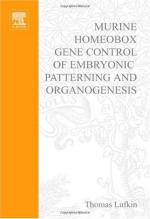|
This section contains 446 words (approx. 2 pages at 300 words per page) |

|
Organogensis refers to that period of time during development when the organs are being formed. After an egg has been fertilized, and has been implanted in the uterus, the developing form is known as the embryo. Organogenesis takes place during this embryonic phase. In fact, most organogenesis has begun as early as week 5 in humans (remember that a normal human pregnancy lasts an average of 40 weeks). Therefore, damage to any of the organ systems of the body which may ultimately result in some type of birth defect usually strikes during this time frame.
By week five, the buds of tissue which will become the limbs are in place. The structures which will become the skeleton, nervous system, and circulatory system of the face, neck, and jaws are in place. A five week old embryo has the early developmental structures of the esophagus, stomach, intestine, liver, and pancreas. The...
|
This section contains 446 words (approx. 2 pages at 300 words per page) |

|


